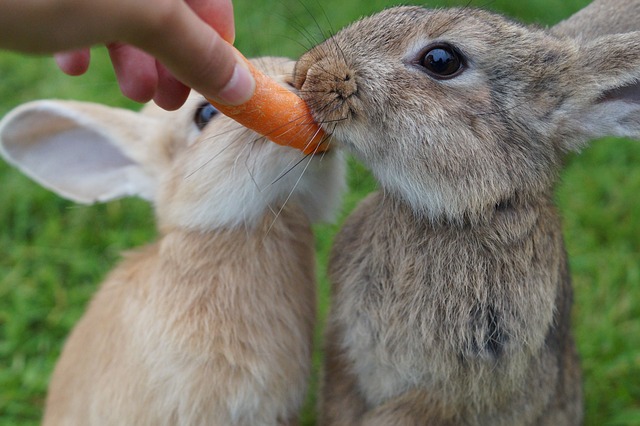Rabbits, also known as bunnies, are beloved for their cute appearance, soft fur, and playful nature. However, ensuring a rabbit's health and happiness starts with a proper diet. Many rabbit owners and enthusiasts ask, "What do bunnies eat?" This article will provide a comprehensive overview of the dietary needs of rabbits, breaking down their primary food groups, feeding routines, and common mistakes to avoid.
The diet of a rabbit significantly impacts its lifespan, overall health, and digestive system.

Rabbits have a unique digestive system designed to process high-fiber diets.
Their gastrointestinal system relies heavily on continuous food movement to avoid blockages or gastrointestinal stasis.
Rabbits' teeth grow continuously throughout their lives.
Eating fibrous foods, such as hay, helps wear down their teeth and prevents dental problems.
Rabbits require a balanced diet consisting of hay, fresh vegetables, pellets, and occasional treats.
Hay should make up 70-80% of a rabbit's daily food intake.
Timothy Hay: The most common and highly recommended type due to its high fiber content.
Orchard Grass Hay: A softer alternative, good for rabbits that prefer milder hay.
Alfalfa Hay: Suitable for young rabbits under 6 months due to its high protein and calcium content but should be limited for adults.
Maintains healthy digestion.
Prevents overgrown teeth.
Provides enrichment and keeps rabbits occupied.
Vegetables provide essential vitamins, minerals, and hydration.
Leafy Greens: Romaine lettuce, kale, cilantro, and parsley.
Non-Leafy Vegetables: Carrot tops, celery, cucumber, and zucchini.
Herbs: Basil, dill, and mint.
Iceberg lettuce (low nutritional value and can cause diarrhea).
Onions, garlic, and leeks (toxic to rabbits).
Adult rabbits: 1-2 cups of fresh vegetables per 4 pounds of body weight daily.
Pellets are a concentrated source of nutrients but should be fed in moderation.
High Fiber: Look for pellets containing at least 18-22% fiber.
Low in Protein and Calcium: Avoid alfalfa-based pellets for adult rabbits.
No Additives: Avoid pellets with dried fruit, seeds, or artificial colors.
Young rabbits (<6 months): 1/4 to 1/2 cup per day.
Adult rabbits: 1/8 to 1/4 cup per day, depending on body size and activity level.
Rabbits must have constant access to fresh, clean water.
Water Bowl vs. Bottle: A heavy ceramic bowl is often preferred as it allows natural drinking behavior and is easier to clean.
Ensure that the water is changed daily.
Treats should only make up 5% or less of a rabbit's diet.
Small pieces of apple (without seeds), banana, strawberries, and blueberries.
Commercial rabbit treats labeled as healthy and sugar-free.
Processed snacks (bread, crackers, chips).
Sugary foods (chocolate, candy).
High-sugar fruits like grapes or cherries in large amounts.
Baby rabbits have specific nutritional needs as they grow.
0-3 Weeks: Baby bunnies rely solely on their mother's milk.
Orphaned bunnies may require kitten formula or special rabbit milk replacer.
Begin introducing alfalfa hay and pellets alongside milk.
Gradually increase solid foods like alfalfa hay and pellets.
Continue feeding alfalfa hay and start introducing small portions of vegetables.
Excessive pellets can lead to obesity and digestive issues.
Abrupt changes in diet can cause gastrointestinal distress. New foods should be introduced gradually over 7-10 days.
Avoid feeding rabbits toxic foods, such as chocolate, avocado, and processed snacks.
A lack of fiber can lead to gastrointestinal stasis, a life-threatening condition in rabbits.
Dehydration can cause serious health issues. Ensure constant access to fresh water.
Fresh hay refill.
Small portion of pellets.
Add fresh vegetables and check water supply.
Treats in moderation (optional).
Ensure hay is available overnight.
Healthy rabbit droppings are round, dry, and consistent in size.
Cecotropes (nutrient-packed droppings) are soft and often re-ingested by rabbits.
A well-fed rabbit will be alert, active, and playful.
Shiny, soft fur and hydrated skin indicate proper nutrition.
Loss of appetite can indicate dental problems, gastrointestinal stasis, or other illnesses.
Tempt your rabbit with safe treats like small slices of banana or fresh herbs.
If your rabbit hasn’t eaten in more than 12 hours, seek veterinary care immediately.
Understanding what bunnies eat is essential for maintaining their health and well-being. A balanced diet of hay, fresh vegetables, and limited pellets ensures that rabbits receive the necessary nutrients. By following recommended feeding practices and avoiding common mistakes, you can ensure your bunny leads a happy, healthy life. Remember that providing fresh water, plenty of hay, and occasional healthy treats will keep your furry friend thriving. If you ever notice changes in your rabbit’s eating habits, don’t hesitate to consult a veterinarian for advice.
animal tags: rabbits
We created this article in conjunction with AI technology, then made sure it was fact-checked and edited by a Animals Top editor.